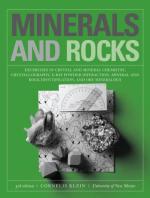|
This section contains 1,470 words (approx. 5 pages at 300 words per page) |

|
A crystal is a patterned three-dimensional assembly of atoms that is a repetitive (periodic) array of atoms. Crystals contain repeating arrays or atoms arranged in unit cells. Crystallography is the study of the formation processes that produce crystals, and of the structural and identifying details of crystals.
In the ancient and medieval world, crystals were considered a strange union of the animal and mineral kingdoms, growing into predetermined shapes like living things but seemingly without life. Many mineralogists hypothesized that their growth was the result of astrological forces. It was not until Robert Boyle and Robert Hooke began experimenting with microscopes that the true nature of crystals began to be understood. During the course of the last three centuries an entire field of study, crystallography, developed to further the understanding of crystals.
All solid matter is either amorphous (without definite shape) or crystalline (from...
|
This section contains 1,470 words (approx. 5 pages at 300 words per page) |

|


